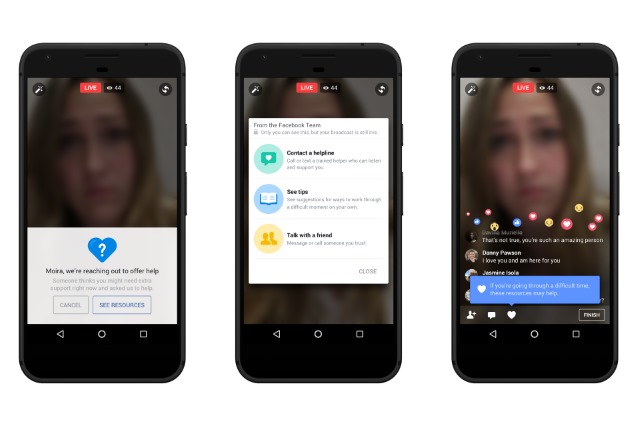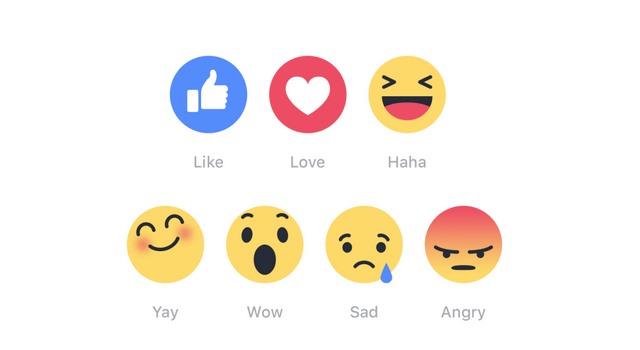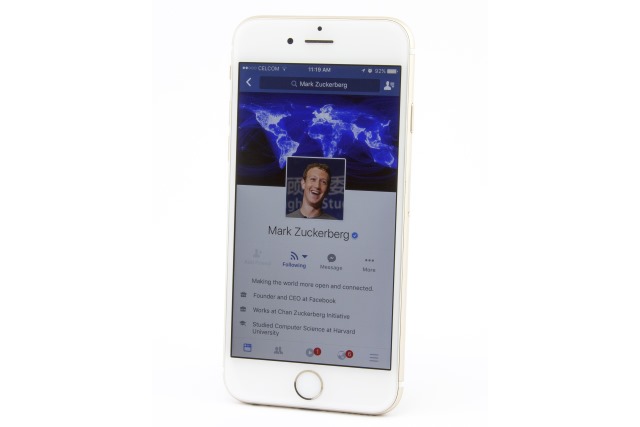
Facebook ramps up its suicide prevention tools and Messenger chat support
Facebook is updating the tools it offers to help try to prevent suicide. Aimed both at those thinking of suicide, and friends and family who are concerned about loved ones, the revamped support tools make use of artificial intelligence and real people to offer help when it is needed most.
This is not the first we have heard about suicide prevention tools from Facebook, and the latest announcement sees the social network taking its "unique position" even more seriously, seeing it as a way to offer help and a means of intervention. It comes after a number of suicides have been streamed via Facebook Live.

Facebook is taking more notice of Reactions than Likes to control your News Feed content
When Facebook first introduced Reactions users were pleased to finally have the chance to be more expressive, rather than simply 'liking' something. But the excitement soon waned when the social network revealed that it didn’t make any difference which Reaction users clicked -- it was simply registered as an interaction.
But now Facebook has revealed that the Reaction you have to individual posts has a greater influence over what appears in your News Feed. A Like registers as a Like, but if you react with Love, Wow, Angry or one of the other reactions, Facebook notes that this is a stronger reaction and tweaks your News Feed accordingly.

Mark Zuckerberg's rambling letter covers fake news on Facebook, nudity and profanity -- and his ego
In a lengthy missive that has been described by some as a manifesto, Mark Zuckerberg has written a counterattack to criticism of his beloved Facebook. He waxes lyrical about a rosy vision of the future in which communities come together, everyone is included, and everyone is empowered -- largely facilitated by him. For a man who denies he has political leanings, he certainly seems to have been studying Speaking Like A Politician 101. He is nothing if not almost impressively vague.
But when Zuckerberg is not massaging his own ego as he dreams up ways to save the world ("I hope we can come together to build a global community that works for everyone"), the content of the website he created still gets a mention. In the age of Trump there is endless talk of fake news, and Facebook has certainly played a role in helping this to spread. This, along with other problems, such as the spread of terrorist propaganda, is something Zuckerberg wants to combat, and he's placing a great deal of confidence in artificial intelligence and his beloved algorithms.

Job ads on Facebook mean you could apply for your next position through the social network
Ads on Facebook are something of a pain, but they could actually about to become rather more useful. Starting tomorrow, the social network will allow business pages to host job ads and anyone interested in the positions will be able to apply directly via Facebook.
Job ads on Facebook were trialed towards the end of last year, but the official rollout starts now. It's a change that sees Facebook treading firmly on LinkedIn's toes, and it's something that has the potential to work well for Facebook, employers and job applicants alike.

How to disable auto-playing sound on Facebook videos
As you'll no doubt have seen, Facebook is introducing several big changes to video on its platform. The most divisive change will be the introduction of auto-playing sound.
"Videos in News Feed have previously played silently -- you tap on a video to hear sound. As people watch more video on phones, they've come to expect sound when the volume on their device is turned on. After testing sound on in News Feed and hearing positive feedback, we’re slowly bringing it to more people. With this update, sound fades in and out as you scroll through videos in News Feed, bringing those videos to life," says Facebook. If that sounds like something you really don't want (and who would want that?), the good news is it's easy enough to disable the new feature.

Facebook Video gets big changes, but they aren't all good
While YouTube is probably the biggest destination for online video, more and more people are sharing videos on Facebook nowadays too. In fact, with the introduction of Facebook Live, many users have also streamed themselves live on the social network. For example, "Chewbacca Mom" went viral with her Facebook video last year.
Today, Facebook announces that it is enhancing the video-watching experience on its platform, thanks to several new features. The social network is improving the way vertical videos look on mobile, but that is no excuse to shoot them this way, folks -- landscape is still the best way to record! Facebook is even enabling a special picture-in-picture mode so you can simultaneously watch a video while scrolling through your feed. Amazingly, that is not all.

WhatsApp adds two-step verification -- here's how to enable it
It has been a little while coming, but WhatsApp is finally rolling out support for two-step verification to its messaging app.
The extra layer of security means that it is now more difficult to gain unauthorized access to an account, and it is a feature that is being made available to iOS, Android and Windows users. With the feature enabled, if you -- or anyone else, for that matter -- tries to verify your phone number on WhatsApp, you -- or they -- will have to provide the 6-digit passcode you create.

Forget prayers, thoughts and sad faces; Facebook Community Help lets you actually help those in crisis
When there is an emergency somewhere in the world -- be it a natural disaster, terrorist attack or humanitarian crisis -- it has become normal to see Facebook's Safety Check feature kick in. As well as letting those affected by the crisis in question let their loved ones know that they are OK, Safety Check activations also result in a flood of thoughts, prayers and sad-faced emoji being sent by Facebookers.
But what about sending actual help? Sending thoughts and prayers is something of an empty gesture, whereas offering shelter, food and other supplies could actually help to save lives. Facebook has now expanded its Safety Check tool to include Community Help, enabling helpful souls to lend support in times of need.

Facebook rolls out creepy Discover People feature on mobile, suggesting you make friends with strangers
If you're using the Facebook app on your phone, you might notice the appearance of a new Discover People section. As you would probably guess this is a feature designed to connect you with people on the social network, but there's something of a creepy twist.
Unlike the current "People you may know" section which suggests that you might like to become friends with people because you have a common acquaintance, the experimental Discover People adopts a different approach. It suggests that you become friends with complete strangers.

Facebook ordered to pay $500 million to ZeniMax in Oculus Rift lawsuit
Facebook-owned Oculus must pay half a billion dollars to game company ZeniMax after a Texas jury deliberated in a case about the Oculus Rift headset. The jury found that Oculus co-founder, Palmer Luckey, failed to comply with a non-disclosure agreement.
Although now facing a $500 million bill, not everything in the case went against Facebook. Oculus was found not to have stolen trade secrets from ZeniMax, and the company plans to appeal against the charges for which it was found guilty.

Facebook launches new open source account recovery tool: Delegated Recovery
At the USENIX Enigma conference, Facebook unveiled a new way to overcome the problem of forgotten passwords. Known as Delegated Recovery, the mechanism essentially allows two online services a user has accounts with to be used as a form of two-factor authentication.
Delegated Recovery is something of a new take on 2FA, building on Facebook's previously announced support for U2F Security Keys. The problem with password recovery via email or SMS, is that it's easy for the recovery medium to be compromised, and security questions are easily guessed. Delegated Recovery takes a new approach, and it's being trialed on GitHub.

Facebook fights fake news with a trio of tweaks to trending topics
The problem of fake news has been around for a little while -- particularly on Facebook -- but it's something that has been thrown into the spotlight thanks to President Trump and his continuing complaints about the media, in particular about the size of his inauguration crowds.
Facebook is one of many technology companies to announce plans to tackle fake news, and now the social network has unveiled its latest round of fakery fighting. Three major changes are coming to Trending topics: firstly, Facebook will no longer personalize news for individual users; secondly headlines and sources will be listed alongside topic headings to help give context; finally the trending algorithm is being updated.

Here, FIDO! Facebook adds security key protection
Hackers are always keen to get their hands on people's social media accounts, so adding two-factor security is a good way of keeping your login details secure if someone tries to access your account on another device.
Facebook has offered verification by SMS message or mobile app for a while but it's now going a step further by making the FIDO U2F (universal 2nd factor authentication) security key available as part of its login process.

Facebook makes its privacy settings much clearer
Facebook has made lots of changes to its privacy settings over the years, usually in a bid to make them simpler to understand and use, yet many people just stick with the defaults.
Facebook’s new Privacy Basics aims to make it much easier for people to find the tools they need to control their information on the social network.

Facebook rolls out Messenger interface for web inbox
Facebook has started to roll out the Messenger.com interface as a replacement for the longstanding message inbox on the web. The latest design should feel much more familiar to folks who use the chat service on their smartphones, as it closely resembles the Android and iOS apps.
There is no official announcement yet, but you should start seeing the new interface soon on your account. It debuted nearly two years ago as a standalone website and alternative to the message inbox for folks who do not want to visit Facebook (or wish to create an account with the social network, for that matter).
